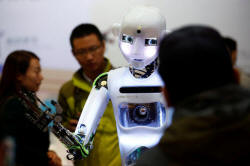|
Impact of job-stealing
robots a growing concern at Davos
 Send a link to a friend
Send a link to a friend
 [January 20, 2017]
By Martinne Geller and Ben Hirschler [January 20, 2017]
By Martinne Geller and Ben Hirschler
DAVOS,
Switzerland (Reuters) - Open markets and global trade have been blamed
for job losses over the last decade, but global CEOs say the real
culprits are increasingly machines.
And while business leaders gathered at the annual World Economic Forum (WEF)
in Davos relish the productivity gains technology can bring, they warned
this week that the collateral damage to jobs needs to be addressed more
seriously.
From taxi drivers to healthcare professionals, technologies such as
robotics, driverless cars, artificial intelligence and 3-D printing mean
more and more types of jobs are at risk.
Adidas <ADSGn.DE>, for example, aims to use 3-D printing in the
manufacture of some running shoes.
"Jobs will be lost, jobs will evolve and this revolution is going to be
ageless, it's going to be classless and it's going to affect everyone,"
said Meg Whitman, chief executive of Hewlett Packard Enterprise <HPE.N>.
So while some supporters of Donald Trump and Brexit may hope new
government policies will bring lost jobs back to America's Rust Belt or
Britain's industrial north, economists estimate 86 percent of U.S.
manufacturing job losses are actually down to productivity, according to
the WEF's annual risks report.

"Technology is the big issue and we don't acknowledge that," Mark
Weinberger, chairman of consultancy EY, said on Thursday, arguing there
was a tendency to always blame trading partners.
The political backdrop is prompting CEOs to take more seriously the
challenge of long-life training of workforces to keep up with the
exponential growth of technological advances.
"I think what we're reaching now is a time when we may have to find
alternative careers through our lifetime," Microsoft <MSFT.O> Chief
Executive Satya Nadella told Reuters.
Over the last decade, more jobs have been lost to technology than any
other factor, and John Drzik, head of global risk at insurance broker
Marsh, expects more of the same.
"That is going to raise challenges, particularly given the political
context," Drzik, who helped compile the WEF report, said. Compared to
clamping down on immigration by tightening borders, dealing with the
impact of technology destroying jobs is something that is perhaps even
less easily controlled.
For while many advanced technologies remain more expensive than low- or
medium-skilled labor in the near term, the shift is likely to accelerate
as costs come down.
WIDENING GAP Technological advancements require governments, businesses
and academic institutions to develop more educated and highly skilled
workforces, executives in Davos said.
[to top of second column] |

People look at a RoboThespian humanoid robot at the Tami
Intelligence Technology stall at the WRC 2016 World Robot Conference
in Beijing, China, October 21, 2016. REUTERS/Thomas/File Photo

But
this shift to skilled workers also widens the income gap and fuels growing
inequality. [nL5N1F01GV]
Jonas Prising, CEO of staffing firm ManpowerGroup, noted that U.S. unemployment
is only about 2 to 2.5 percent among college-educated people but 9 or 10 percent
among those with low or no skills. "The idea that we would ban automation as
part of an evolution within the manufacturing industry, is not really part of
the discussion," Prising said.
He pointed to policies in countries like Denmark and Italy, where there is a
focus on employability of workers.
"If we don't own responsibility (for the problem of displaced workers), it's
only going to get bigger," Procter & Gamble <PG.N> Chief Executive David Taylor
said.
BRAWN AND BRAIN
The scope of the employment risk from what the WEF calls the "fourth industrial
revolution" which "blurs the lines between the physical, digital, and biological
spheres" is unclear.
A University of Oxford study in 2013 said nearly half of U.S. jobs were at risk,
while in 2015 Forrester Research predicted a net loss of only 7 percent by 2025,
as some lost jobs will be replaced with new ones.
Forrester predicts that by 2019, one-quarter of all job tasks will be offloaded
to software robots, physical robots, or customer self-service automation.
Even the corner office may not be safe.

"CEOs feel reasonably confident we are not going to be replaced by artificial
intelligence," Inga Beale, CEO of the Lloyd's of London [SOLYD.UL] insurance
market, said.
"But I'm sure there will be a time!”
(Editing by Alexander Smith)
[© 2017 Thomson Reuters. All rights
reserved.] Copyright 2017 Reuters. All rights reserved. This material may not be published,
broadcast, rewritten or redistributed. |